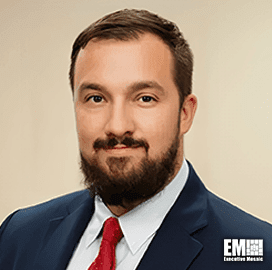
Member Profile: Rowan Davison of EXA Infrastructure
Potomac Officers Club was pleased to engage new member Rowan Davison in a lively discussion that illuminated his growth trajectory, the core values of his management style and the changes he’d make to the federal government. Davison is defense and government lead at EXA Infrastructure, a London, U.K.-based provider of digital infrastructure to many U.S. federal clients.
EXA is known for its work in the telecommunications realm, establishing and operating mission-critical networks for agencies and DOD components. If you’re invested in these same objectives—connecting federal and defense systems with high-speed access and comms—be sure to attend POC’s 2025 5G Summit, coming soon on Thursday, Feb. 27. Explore the full lineup and register now.
Potomac Officers Club: What can you tell us about your background and how you’ve been able to adapt to the ever-changing challenges of the federal landscape over the course of your career?
Rowan Davison: I served in the U.K. Special Forces, specializing in communications, where I gained extensive experience operating in complex and dynamic environments that required secure, resilient and high-performance networks. Transitioning from the military into the defense industry was a natural progression, allowing me to apply my expertise to support critical government and defense initiatives. Initially, I focused on the U.K. government landscape, working closely with key stakeholders to navigate the intricate policies, procurement frameworks and evolving technological requirements.
Since joining EXA Infrastructure, I have broadened my expertise further into the U.S. federal space. While the U.S. and U.K. government landscapes share similar complexities, including stringent security standards, procurement challenges and evolving operational needs, success in this space requires a deep understanding of the policies, frameworks and networks that drive decision-making. My background has equipped me to adapt to these ever-changing challenges by leveraging strategic relationships, understanding regulatory policies and ensuring that mission-critical infrastructure meets the evolving demands of government and defense agencies.
Ultimately, my ability to adapt stems from my experience in both military and commercial environments, where agility, foresight and a proactive approach are essential to staying ahead of the curve in an ever-evolving federal landscape.
POC: How would you describe your management style and core values towards building a winning culture?
Davison: I would describe my management style as collaborative, empowering and results-driven. I believe that instilling a positive and winning mentality within a team starts with fostering a can-do attitude—one that embraces challenges, encourages innovation and pushes boundaries to achieve success. A winning culture is built by trusting in the experience and knowledge of the team, where great ideas can come from anyone, regardless of job title or position. Leadership doesn’t mean you always have the best or the right ideas; success comes from harnessing the collective intelligence and strengths of the team to create the best possible outcomes.
Some key values and principles that I believe contribute to a winning team culture include:
- Empowerment and ownership – Giving people the autonomy to take responsibility for their work fosters confidence and accountability, leading to a team that is proactive rather than reactive.
- Open communication and transparency – A team performs best when there is trust and clarity. Creating an environment where people feel comfortable sharing ideas, raising concerns and providing feedback is crucial.
- Resilience and adaptability – In a fast-paced, ever-changing environment, the ability to adapt and overcome obstacles is vital. Encouraging a mindset that sees challenges as opportunities fosters long-term success.
- Continuous learning and growth – A strong team never stops evolving. Promoting professional and personal development ensures that we stay ahead of the curve and continue to push for excellence.
- Collaboration and shared success – True success is built on collective effort. Recognizing and celebrating team achievements fosters unity and motivates everyone to strive for even greater results.
By embracing these values, I aim to create a culture where people feel motivated, supported and driven to succeed—not just as individuals but as a team working toward a common goal.
POC: If you were given free reign to enact changes in the federal landscape, what are the first three changes you would implement and why?
Davison: If I were given the ability to implement changes in the federal landscape, the first three changes I would prioritize are:
- Enhanced user feedback integration – I would advocate for a system where direct feedback from end-users on the ground is shared more freely with trusted industry partners. Too often, decision-making is removed from those who rely on the solutions daily. By improving this feedback loop, industry can better align with user requirements and pain points, ultimately influencing decision makers to procure solutions that are the most feasible and effective for their operational needs.
- Streamlined procurement frameworks – The procurement process should be more user friendly, enabling faster sales cycles and quicker delivery of critical products and services. Reducing bureaucratic bottlenecks would allow federal agencies to access the technology and infrastructure they need more efficiently, ensuring mission success without unnecessary delays.
- A more unified approach to procurement – The current landscape often involves multiple organizations, adding layers of complexity and inefficiency. A more joined-up approach would not only enhance value for money by reducing redundant steps but also provide federal agencies with clearer and faster escalation routes to industry. This would lead to more direct engagement, faster problem resolution and ultimately, improved operational outcomes.
By implementing these changes, we could foster stronger collaboration between government and industry, ensuring that federal agencies receive the best solutions with the speed, efficiency and value they require.

Category: Executive Spotlight




